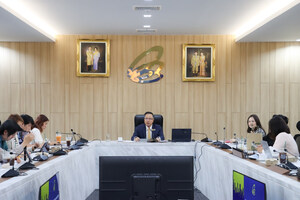BANGKOK, June 26, 2017 /PRNewswire/ -- The UN Food and Agriculture Organization projects the global population could swell to 10 billion in the next 50 years. Feeding that many additional people will require new technologies and practices that are scalable, profitable, and ecologically sustainable.
Logo - http://mma.prnewswire.com/media/527520/BOI_Logo.jpg
Thailand is stepping up to strengthen food supply with a generous investment program designed to cultivate innovation-driven projects. "Thailand 4.0" economic model offers generous incentives and tax exemptions to high tech companies that set up advanced manufacturing facilities in the country -- including agro-processing and food for the future.
| Government outlays for agriculture across Asia in 2014 |
|
| Country |
Total value (billion dollars) |
| Republic of Korea |
293.44 |
| Indonesia |
164.89 |
| Thailand |
89.21 |
| Viet Nam |
57.61 |
| Singapore |
46.16 |
| Pakistan |
45.34 |
| Sri Lanka |
13.86 |
| Mongolia |
3.48 |
| Timor-Leste |
1.36 |
| Bhutan |
0.53 |
| Data: UN FAO Database, (Exclude Japan) |
|
Alongside its internationally rated cuisine, Thailand is a farming powerhouse. Roughly 40% of its population works in the agricultural sector. The country's home-grown food processing industry ships a huge range of products (from seafood to energy drinks) to supermarket shelves across the globe. And it has pioneered technologies to increase yields for Asia-specific crops and staples.
Precision farming is an obvious bet for Thailand. Like many other countries, the Thai workforce is aging; By 2040, more than a quarter of the population will be 65 years of age or older. With a smaller agricultural labor force, robotics, automated sensors, and crop-monitoring drones will be essential in boosting agricultural yields. And while there are a number of global start-ups focused on farm tech, the specifics of rice production call for more localized solutions. Scalability is also critical -- which will necessitate investment in automation throughout the agricultural lifecycle, from cell culture technology to bioanalytics.
Thailand's expertise in processing and products is well known. But there are plenty of advances to be made in bioprocessing, material sciences and biodegradable packaging. Take food losses -- where distribution and logistics hiccups lead to perfectly good food spoiling long before humans can get to it. Despite its world class infrastructure, the US is estimated to lose around 65 million tons of food this way each year. Start-ups that can engineer food to be less susceptible to travel or heat damage will be critical in increasing nutrition access in the developed and developing worlds alike. There is appetite for more eccentric ideas too; Bangkok-based Italian startup Bugsolutely is pioneering cricket pasta as a healthy, high protein alternative.
With the arrival of biotech breakthroughs like CRISPR, the food and agriculture sector is ripe for disruption. Thankfully, many world tech labs and pharma companies already call Thailand home. The combination of a rich food-tech ecosystem and cost-effective operating environment makes the nation perfect for incubating embryonic concepts; Chiang Mai-based researchers are already using molecular-marker technology to cut seed line development time in half. More projects like this that push the envelope on molecular and genetic engineering are especially welcome. As climate change leaves millions more in need of food aid each year, the development of more robust crops that can survive droughts and flooding will take on new urgency.
| Foreign Direct Investment across sectors in Thailand |
|
| Sector |
Total FDI (billion dollars) |
| Automotive |
1.949 |
| Electrical |
1.766 |
| Petrochemicals |
1.058 |
| Textiles |
0.369 |
| Agro-processing |
0.335 |
| Tourism |
0.262 |
| Medical |
0.194 |
| Aerospace |
0.078 |
| Digital |
0.051 |
| Robotics |
0.035 |
| Data: Thailand Investment Review, February 2017, vol.27 no.2 |
|
Thailand's strategic location at the center of Asia and its deep investment in trade and logistic infrastructure make it a perfect gateway to ASEAN and its 630 million inhabitants. The country has also invested heavily in education: a network of 24 universities sees 7,000 students graduate each year with a biotechnology background.
In 2016 alone, Thailand Board of Investment (BOI) approved more than 320 agricultural projects valued over $4.8 billion. Incentives are especially compelling for innovative projects in fruit and vegetable food packaging, biofuel manufacture, supplements and medical food, rubber science and extraction of bio-active ingredients.
YouTube: Food Innovation - https://www.youtube.com/watch?v=Wc61zzI16hc&t=56s
For those with big ideas and the desire to impact food security and sustainability, Thailand 4.0 may just be the ticket.
For more information, please contact:
Apichaya Sophonratana
thailandinvestmentyear@gmail.com or www.boi.go.th
Tel. +662-553-8111 Ext. 6932




Share this article